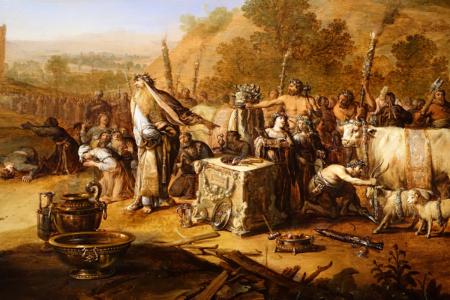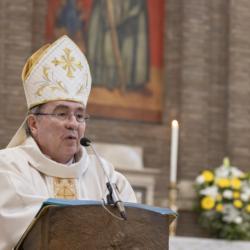Savior of God?
The complementarity of the roles of Joseph and Mary in the Holy Family, as man and woman, seems to have been both intended by God's providence and emphasized by the Gospel writers.
Fundamentally, they both receive the Lord. An angel of the Lord appears to Mary at the Annunciation, to ask her to accept the Savior into her womb. Likewise an angel appears to Joseph in a dream, to ask him to take the mother Mary into his home, and hence her child in utero, the Lord. Mary and Joseph both freely say "yes," and the Lord enters their lives.
Yet Mary's distinctive way of acting is to receive. Her role is to bear and to nurture the Lord, even, to show Him hospitality -- her commitment to which is revealed in how she immediately leaves to visit her kinswoman Elizabeth, an act of compassion and support for a woman similarly expecting in difficult circumstances.
Her receiving the Lord in the flesh is one and the same with her receiving him spiritually, since her life becomes dedicated to "storing up" these realities in her heart and contemplating them.
In contrast, Joseph receives through acting. Joseph is therefore a man of judgment, because for him judgment precedes action.
When the angel in the dream tells him to take Mary as his wife, this provides him with the resolution of a difficulty which, the Gospel writer tells us, he had been carefully deliberating already. In his own judgment he affirms what the angel says and acts accordingly.
If the words that reveal Mary's character are "Fiat mihi!" -- "Let it be done to me!"-- Joseph's word, in contrast, would be simply "Fiat!" -- "This is to be done."
Consequently to Mary is given the role of bearing the Child. But Joseph names the Child. The angel tells Joseph that "She will bear a son, and you are to name him Jesus." St. Matthew reports accordingly that "she bore a son, and he named him Jesus." To receive and to bear are intimate and feminine; to impose a name is public, juridical, and masculine.
But the most striking complementarity is that between their different responsibilities for the very life of the child. Mary is the natural parent of the child. Jesus takes his body and human life from her. She conceives him, carries him, nurses him, and tends to him. As with any infant, the life of the Christ-child depends completely on her.
Because that child is God, from this role Mary has won the title "Theotokos" or "God-bearer."
The Annunciation is sometimes said by spiritual writers to be akin to a proposal of marriage. God wished to effect a "wedding" of divine to human nature in the Incarnation. Yet he would not force this on us. Mary's "Fiat!" was her acceptance of this proposal on behalf of us all. Because of the freedom of her consent, Mary is credited with the life of the child, and thus with all of its ramifications for us. That is why "Theotokos" does not merely signify a biological relationship but rather is a high spiritual and moral title.
However, just as Mary bears the child, so Joseph saves him. Recall something else which an angel tells Joseph in a dream: ''Rise, take the child and his mother, flee to Egypt, and stay there until I tell you. Herod is going to search for the child to destroy him." Startlingly, Joseph gets up immediately after he has this dream, in the middle of the night; packs up their belongings; rouses his wife; and before dawn starts out with them on the long trip to Egypt!
His actions are those of a man facing an emergency. If we can assume that God does nothing in vain, and therefore commands nothing in vain, it seems that we must conclude that the very next day Herod's henchman would have arrived to kill the Child, or at least that this was a serious risk. Joseph had to get the child away immediately.
Because Joseph's action is free -- what could be more free than an action carried out, from prudential judgment, against inclinations to comfort and sleep? -- he can be credited with saving the child's life. From the fact that St. Matthew devotes half of chapter 1 to the birth of the Lord, but all of chapter 2 to the drama of Herod's pursuit of the child's life, we see can that the Gospel writer regards Joseph's intervention as nearly as significant as Mary's.
By Mary's consent the Savior entered the world. She received the Child, but the world "received him not." In the person of Herod, the world attempts to expel and slaughter the Messiah-King. Joseph's complementary role is to protect, shield, and save the Christ-child from this attack. He is therefore the Savior of the Christ, the Savior of the Savior.
But since that Savior is God, by the same reasoning through which one concludes that his spouse is "Theotokos," one may apparently conclude similarly that Joseph is the Savior of God.
There is rich material here for reflection and imitation by Catholic men. The man who gives his pregnant girlfriend money for an abortion? He is an anti-Joseph, who betrays the child to the executioner. The man who fails to take the mother of his child as his wife? Also an anti-Joseph.
The household of the Church suffers depredation because there are so few Josephs.
Michael Pakaluk is Professor of Philosophy at Ave Maria University.



















